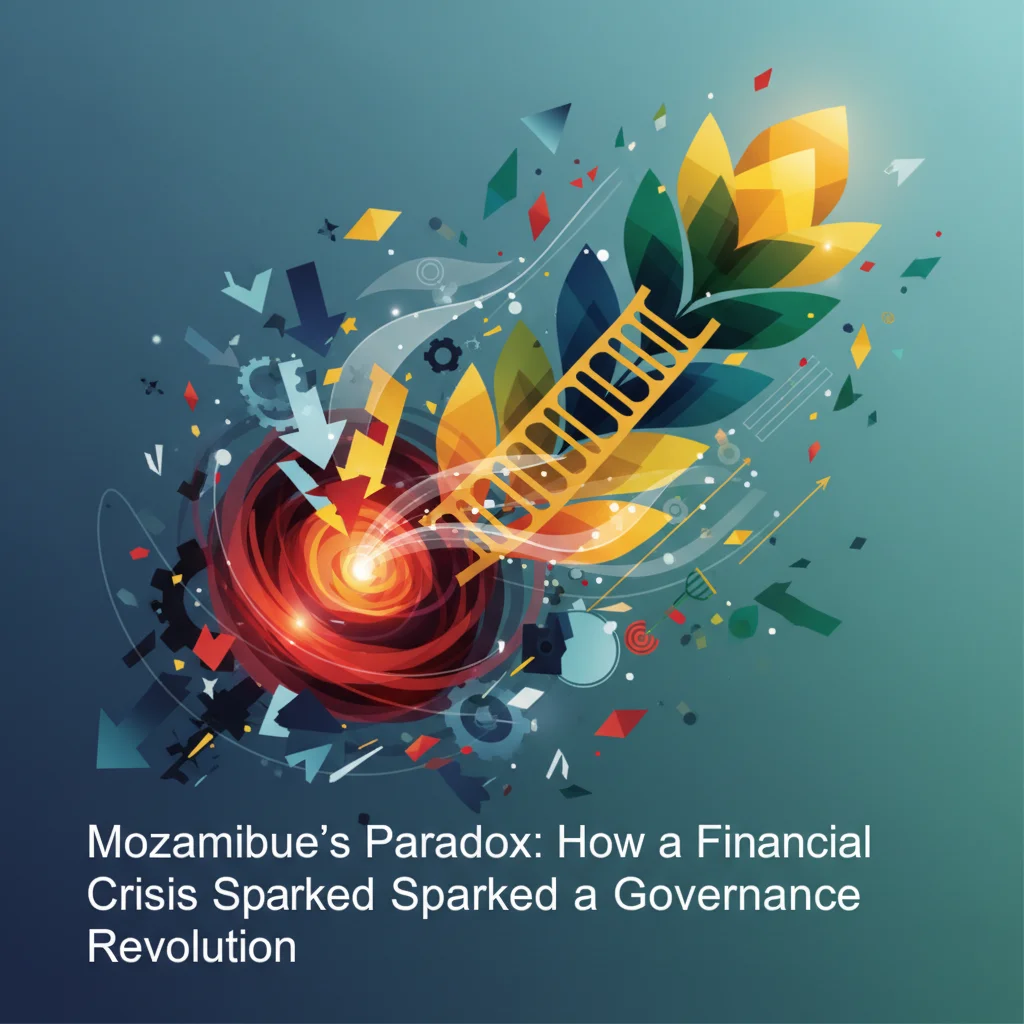
Mozambique’s Paradox: How a Financial Crisis Sparked a Governance Revolution
In the world of international development and finance, the prevailing wisdom is clear: foreign aid is a vital lifeline for developing nations. It builds schools, funds hospitals, and provides a crucial safety net in times of crisis. Consequently, the decision to cut aid is often seen as a catastrophic blow, punishing the most vulnerable for the misdeeds of their leaders. But what if this conventional narrative is incomplete? What if, under specific circumstances, the withdrawal of foreign funds could trigger a positive, transformative change?
This isn’t a theoretical exercise. The recent history of Mozambique offers a compelling, real-world case study that challenges our deepest assumptions about aid, accountability, and the path to sustainable economic reform. Following a massive corruption scandal in 2016, international donors suspended aid, plunging the nation into a severe financial crisis. The expected outcome was collapse. Instead, something remarkable happened. Forced to stand on its own two feet, the Mozambican government began a slow but significant pivot, turning inward to its own citizens for revenue and, in the process, becoming more accountable to them.
This story is more than just a geopolitical curiosity; it holds profound lessons for investors, finance professionals, and business leaders. It suggests that the true health of an emerging economy isn’t measured by the volume of aid it receives, but by the strength of the relationship between its government and its people. It’s a narrative that reshapes our understanding of risk, reform, and the fundamental drivers of long-term value in the global economy.
The Anatomy of a Crisis: The “Tuna Bonds” Scandal
To understand Mozambique’s transformation, we must first revisit the scandal that started it all. In 2016, the global financial community was rocked by revelations of over $2 billion in hidden government-guaranteed loans. These loans, ostensibly for state-owned enterprises to develop a tuna fishing fleet and maritime security, were largely fraudulent. The discovery of this “tuna bonds” scandal shattered investor confidence and, crucially, violated the terms of the country’s agreements with the International Monetary Fund (IMF) and other international donors.
The response was swift and severe. The IMF, World Bank, and a coalition of 14 donor countries suspended direct budget support to Mozambique. For a nation heavily reliant on foreign aid to fund its public services, this was an economic earthquake. The country defaulted on its debt, its currency plummeted, and its access to international capital markets vanished. The traditional playbook suggested a grim future of austerity, declining public services, and social unrest. But the crisis created an unexpected imperative: survival.
With the external taps turned off, the government had only one place to look for revenue: its own domestic tax base. This created a fundamental shift in the social contract. A government funded by foreign powers is primarily accountable to those foreign powers. A government funded by its own citizens, however, is ultimately accountable to them. If you want people and businesses to pay taxes, you must provide the services, security, and stability that make their economic activity possible.
UK's Potential Energy VAT Cut: A Lifeline for Households or a Risky Economic Gamble?
From Dependency to Accountability: A Surprising Turnaround
This shift from external dependency to internal accountability is the core of Mozambique’s story. As Faisal Tajdar of Acasus noted in a letter to the Financial Times, this forced reform had a tangible, life-saving impact. He highlights a stunning statistic: between 2017 and 2022, the number of children receiving all basic vaccinations in their first year of life increased by a staggering 45%.
This wasn’t a coincidence. It was a direct result of a government that now had to demonstrate its value to its taxpayers. The focus shifted to delivering core services that citizens could see and feel. This dynamic change can be visualized by comparing the pre- and post-crisis governance models.
The following table illustrates the conceptual shift in Mozambique’s governance and economic focus following the 2016 aid suspension:
| Metric | Pre-Crisis Model (Aid-Dependent) | Post-Crisis Model (Tax-Reliant) |
|---|---|---|
| Primary Source of Funding | Foreign aid, international loans | Domestic tax revenue |
| Primary Accountability | International donors, IMF, World Bank | Domestic taxpayers (citizens and businesses) |
| Government Incentive | Meet donor conditions, maintain aid flows | Deliver public services, foster economic growth to expand tax base |
| Example Outcome | Vulnerability to external shocks, potential for complacency | 45% increase in child vaccinations (2017-2022) (source) |
The Broader Implications for Economics and Financial Technology
The Mozambique paradox resonates with well-established theories in economics, most notably the concept of the “resource curse.” Countries blessed with vast, easily extractable natural resources often suffer from poor governance and slower economic growth because the state doesn’t need to develop a productive, diversified economy to fund itself. Unearned revenue, whether from oil or aid, can sever the vital link of accountability between a government and its people.
This is where modern financial technology offers a pathway to accelerate the positive feedback loop seen in Mozambique. Strengthening a domestic tax base is no longer just about policy; it’s about technology.
- Fintech and Banking: The proliferation of mobile money and digital payment systems can rapidly formalize a gray economy. When transactions move from untraceable cash to digital records, it dramatically expands the tax base. This allows governments to raise revenue more efficiently and equitably, strengthening the fiscal foundation of the state.
- Blockchain Technology: While often associated with trading and cryptocurrency, blockchain’s real potential in emerging economies lies in governance. A transparent, immutable ledger for land registries, government contracts, or aid distribution can drastically reduce corruption. This builds the trust necessary for citizens to willingly pay taxes, knowing the funds are less likely to be siphoned off.
For the finance and investing community, these technological trends are critical signposts. A country actively adopting fintech to improve tax collection and transparency is a country serious about building a sustainable economic future. It signals a move away from dependency and towards self-reliance—a powerful de-risking factor for foreign direct investment. A more stable fiscal position can lead to a stronger currency, a more predictable bond market, and eventually, a thriving domestic stock market.
UK Hints at Energy VAT Cut: A Lifeline for the Economy or a Risky Fiscal Gamble?
A New Lens for Evaluating Emerging Markets
The conventional approach to analyzing emerging markets often over-weights external factors—commodity prices, global interest rates, and foreign aid flows. The Mozambique case study urges us to look deeper, to analyze the internal dynamics of the social contract.
Investors and business leaders should ask new questions:
- What is the trajectory of domestic tax revenue as a percentage of GDP? A rising figure indicates a strengthening state and a broadening economy.
- Is the government investing in technology to improve fiscal transparency and efficiency? Adoption of modern fintech for public finance is a strong positive signal.
- How is public sentiment towards the government’s service delivery? Improved outcomes, like the vaccination rates in Mozambique, are a proxy for a government earning its “license to tax.”
Answering these questions provides a more robust framework for assessing long-term risk and opportunity than simply tracking aid disbursements. While the road for Mozambique remains challenging, the country has been forced to lay a more durable foundation for its future. The crisis, as painful as it was, may have been the catalyst required to escape the gravitational pull of aid dependency and begin the difficult work of building a state accountable to its own people.
Unlocking Africa's Capital: The Audacious Case for a Unified Pan-African Stock Exchange
In conclusion, the story of Mozambique is not a simple tale of success, but a complex and powerful lesson in the principles of economics and governance. It demonstrates that true economic resilience is not imported; it is forged at home. It is built on the bedrock of a government that serves its citizens and is, in turn, funded by them. For those navigating the intricate world of international finance and investing, this paradoxical “silver lining” from a devastating crisis offers a timeless insight: the most valuable asset any nation can have is the trust of its own people.


